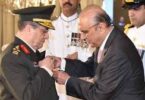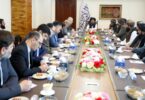NATHAN TORONTO
David Chuter is an independent researcher who has worked for 30 years as a civilian government official in security sector reform and defense management. He is the author of the book Governing and Managing the Defense Sector, which covers the essentials of defense and security policymaking, implementation, and organization from a practical perspective. Diwan interviewed Chuter in mid-January on the occasion of the translation of his book into Arabic. The book will be released on February 8, and can be read here.
Nathan Toronto: What prompted you to write Governing and Managing the Defense Sector? What need did it fill?
David Chuter: I wrote this book, essentially, because I was asked to write it. I worked in the British government, and then in the French government, for more than 30 years as a civilian defense official. During that time, and even more after I retired, I was asked to lecture and teach in different countries, sometimes formally, sometimes sitting around a table with ministers or generals, talking about some of their problems. I did this all over the world—very largely outside Europe, mostly in Africa, in Asia, and in more recent years also in the Arab world, in countries such as Algeria, Lebanon, and Sudan.
I found that the same questions tended to come up time and time again, and after a number of years people started to ask me, “Is this written down anywhere? What you’re saying is very interesting, but can I read it somewhere?” This led to a demand for articles, and then a small book about 20 years ago, and finally this present book, which in a sense is my attempt to produce a summary or overview of the sorts of practical questions I was asked over the course of perhaps 25 years, and the kinds of practical answers that I tried to give to them in many different countries around the world.
NT: Is your book specifically intended as a guide to achieving democratic governance of the armed forces?
DC: The book is not intended as a set of instructions. You won’t find in it any list of “best practices.” You won’t find any list of things you must or mustn’t do. It’s not normative in any way. It doesn’t make any assumptions about the political system in which defense is being managed, and it doesn’t make any assumptions either about the history or the culture or the origins of the military forces which the defense function is managing. The book is completely agnostic.
What it offers is primarily a set of pragmatic discussions about things that, by and large, have worked in different parts of the world, and things perhaps that have worked less well, taking into account very different cultural and historical and political contexts. And there’s a lot of experience around the world to draw upon. I used to say that the British, for example, don’t get everything right, but they’ve had 350 years of making mistakes and, one hopes, learning from them.
The purpose of the book is to offer experience and options drawn from around the world, and I’ve always resisted attempts to solve other people’s problems for them. I don’t have the answers, but I do have some pragmatic guidance, suggesting that this might work, and that something else might work less well, given that the management and governance of defense differs around the world. The way that the defense sector and the military fit into a state as a whole is what we call civil-military relations, and the book approaches this in a completely pragmatic way, without any presuppositions at all.
The books talks about what, in the 2018 Research Manual for the Program on Civil-Military Relations in Arab States (CMRAS), retired Jordanian Major General Mohammed Farghal and I called the “developed model.” This is a model to which—or in the direction of which—security sectors and defense sectors tend to find their way historically. It’s wholly pragmatic. Over the course of time, defense sectors tend to evolve in a particular way, and it’s that model, insofar as there is one, which is behind the book, recognizing of course that this will be very different in different historical and political contexts.
NT: So, if you are not establishing normative measures, what should the goal be of governing defense sectors? Why should we care about how civil-military relations are structured?
DC: I said a moment ago that this was a pragmatic approach, and that to the extent that there is a model behind it it’s what General Farghal and I called the “developed model.” This is the model to which, pragmatically, most countries find their way over a period of time. It may be unclear why the military specifically has this particular problem—why we even have to talk about this “developed model”—but it comes ultimately from the fact that in every civilization that we’ve ever known, the military began pretty much as the extended bodyguard of the king. The job of the military 5,000 years ago in Egypt was to keep the king in power and to keep the regime in power. This is typical of the experience of all states.
The important idea here is normalization. The defense function, which is very special and very difficult, becomes normalized as part of the running of the state, just like other functions of the state, such as health or education. There’s no magic solution to this, and it takes a while, but the objective is that defense becomes a normalized function, and it becomes treated within government much as other areas of government are.
Consider the model for a moment. I talked about a Health Ministry or an Education Ministry. The model is that you have technical advisors for the government, and you also have people on the ground to make things happen—teachers or doctors or whatever. The military in a developed and normalized system has essentially that role, which is to say that they advise the government, and they also turn government policy into real action on the ground.
But they don’t run that function. Doctors don’t run the Health Ministry. Teachers don’t run the Education Ministry. The military by analogy doesn’t run the Defense Ministry, either. It’s entirely natural, as with other areas of government, that you have a civilian minister in charge of everything. It’s also obvious, I think, that there are many functions that a ministry has to carry out that the military is not best placed to perform. This gives a picture of a developed and normalized defense function which operates very much the same as any other part of government does.
NT: You know that the CMRAS program seeks to enhance the ability of civilians to engage in defense affairs. You are a civilian defense professional with 30 years experience. Where do civilians fit in?
DC: The first thing to say here is that military officers themselves would accept that there are many roles in the defense area that they’re not necessarily best suited to carry out. Defense goes considerably beyond the military. Not many military officers would join the army to manage money, for instance. Not many would join the air force to write letters to parliament. There are functions in the defense area that make more sense for civilians to perform. This comes with the proviso that the civilians are not trying to do the job of the military, and the military are not trying to do the job of civilians.
There are a whole host of areas where you need a different type of expertise than that which the military has. Likewise, elsewhere in government—for example, in the Finance Ministry, the Interior Ministry, the police, the intelligence services, and the Foreign Ministry—there are all sorts of civilian employees involved with defense as well. The military form part of this overall structure.
That, if you like, is how civilians fit in, working in a defense environment side by side with the military. I’ve worked with the military, I’ve worked for the military, and I’ve had the military work for me, and it can be made to function very well.
As regards civil society, obviously everyone’s entitled to an opinion on defense issues, and to express it. But if you want to go beyond that, if you want to have, for example, journalists or academic researchers or nongovernmental organizations involved with the military, then to be taken seriously by the military they have to do what I had to do. They have to do what any civil servant involved with the military has to do, which is to become literate in defense issues. Not to become a soldier, but to be able to hold an intelligent conversation with the military about subjects with which they deal professionally.
I’ve attended their staff colleges, I’ve flown in their aircraft, I’ve sailed in their ships, and so forth. I can carry out an intelligent conversation with them. It’s also true that I have access to expertise they don’t have, and in my experience the military understands and respects expertise. If you have expertise, military officers will take you seriously, and they will welcome you.
There’s no reason, of principle or of pragmatism, why civilians shouldn’t be involved in defense issues, inside and outside the system. The prerequisite is that they should be able to give an account of themselves. They should have something to bring, and most of all they should know what they’re talking about.
Courtesy: (carnegie-mec.org)






